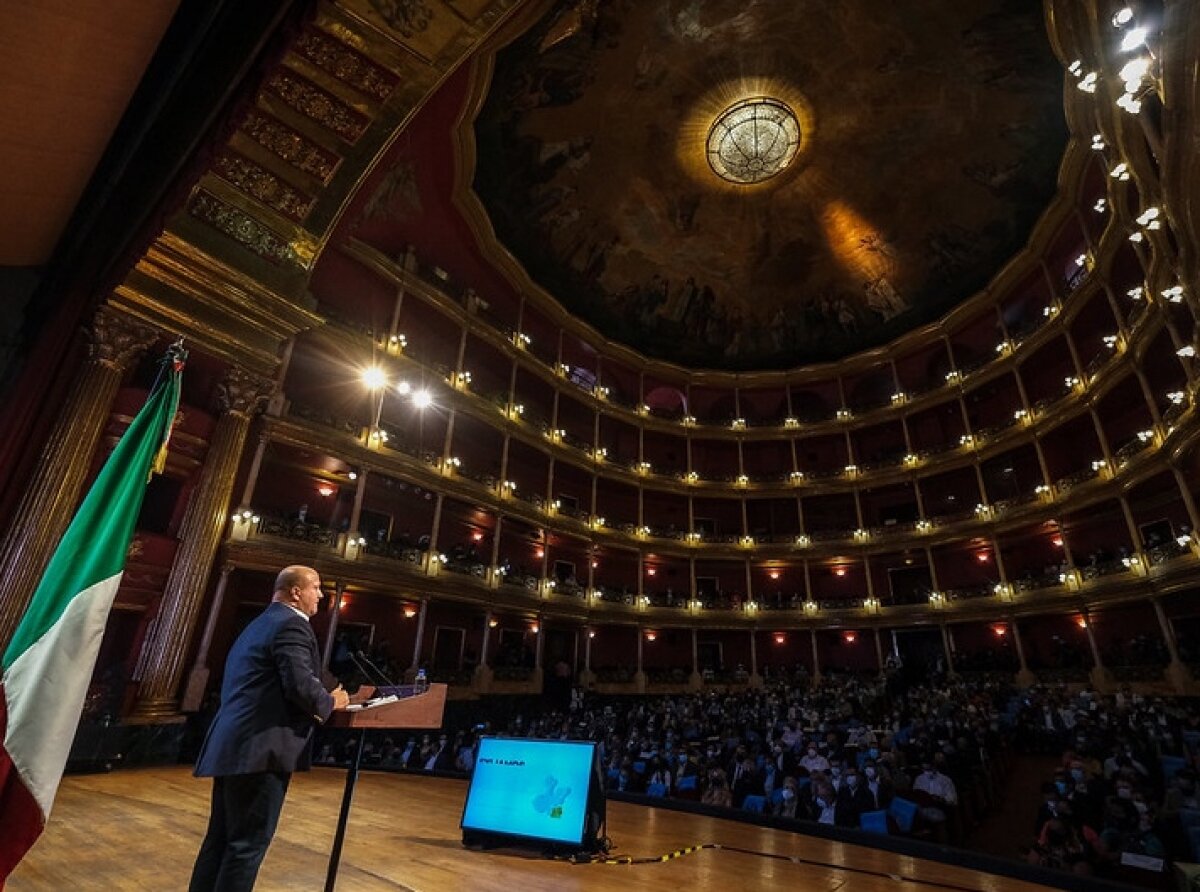Governor Enrique Alfaro Ramírez led the presentation on what will be a citizen consultation on the Fiscal Pact.
With the convocation of the state cabinet, senators, local and federal deputies, heads of the Judiciary, municipal presidents, private initiative, universities, the media, members of civil society, indigenous peoples and religious leaders, the Fiscal Pact that will take place in November and December will be to the voice of: “Jalisco, it is time to demand fair treatment.” The theme represents that the entity does not seek to leave the Fiscal Pact but to generate a fair and equitable agreement derived from the large economic contributions of collection that Jalisco generates to Mexico.
"We do not want to leave the Fiscal pact, much less do we want to hurt the unity of the nation. What we are saying about this place, from the Degollado Theater, is that with the current agreement there is no future, with the current arrangement we will lead the country to failure, we will collapse local governments and fracture the country. The time has come to act with great determination. We are not going to do it in an insistent spirit, of confrontation with the federation, much less with other states. We do not want to take a weight off any state in the country, we want to stop having this concentration of excessive resource (depletion,) we want there to be an authentic federalism,” declared Alfaro Ramírez.
The president reiterated that Jalisco is part of the said agreement of its own free will, so the citizen consultation that will be carried out by the Electoral and Citizen Participation Institute of Jalisco (IEPCJ,) seeks to generate participation and understanding, and that the issue is appropriated before Jalisco when demonstrating during the exposition the unfair treatment on the distribution and lack of equity that the Federal Government exercises in the distribution of state resources.
“'You cannot get out of the agreement,' I have heard that phrase over and over again and let me tell you from the capital of Jalisco that we are part of an agreement of our own free will because we are a free and sovereign state, and if at any time that agreement is no longer what Jalisco needs, of course our state can make the decision to abandon the fiscal coordination agreement,” clarified the Governor.
Jalisco is the fourth largest economy in the country, explained Enrique Alfaro, being that the state contributes 8 out of every 100 pesos to the national economy, but the Federal Government only returns 2 out of every 100 pesos from the national budget.
The entity has the third highest GDP per capita in the country, but it is the second to last state in resources per capita received of the Federation. The powers most affected by this return of contributions are Nuevo León, Puebla, and the State of Mexico, he pointed out.
He indicated that the Jalisco budget has not grown at the same rate as its economy because thanks to the work of Jalisco, the state economy grew 31% in the last 10 years, but in the same period the transfers from the Federal Government to Jalisco have only grown 23%.
He highlighted the disadvantages that Jalisco has in terms of what a citizen receives in terms of education, security, health and strategic projects, against the other entities of the country where up to three times the resources per inhabitant are allocated.
The Governor recalled that with the installation of the Citizen Table for the Analysis of the Fiscal Pact "New Pact: Fiscal Equity and Solidarity," the steps to be followed for the citizen consultation, led by Enrique Toussaint, were discussed and analyzed.
Finally, he called on those present to inform citizens of the reality that the state is facing and to be part of this consultation that has great impact on Jalisco. It is an established obligation for the Fiscal Coordination Agreements to be reviewed at least every six years, and in the event of not reaching an agreement, to be able to terminate them. Additionally, the immediate creation of a State Tax Administration System is constituted to be used if necessary.
When taking the floor, as representatives of the mayors of Jalisco, Pablo Lemus, stressed that the municipalities are the closest entities with the citizens and those who have suffered for years the inequity in the distribution of resources to be able to operate what It might seem like the smallest but most momentous problems for the colonies and their inhabitants.
"The Federation has turned its back on us," he pointed out. “All municipalities are equal before the law, but different in terms of our needs. It is true that we share problems, however, today it is essential to know how to distinguish needs and priorities from a territorial, political, and social vision and of vocation with attachment to the specific realities,” he added.
Lemus Navarro called to be in solidarity with the municipalities that have the least because part of the budget today does not contemplate the social reality for them, so it is time to build a new agreement.
Within the framework of the presentation, Luis García, treasurer of the Guadalajara City Council, explained the mechanism of this agreement made 40 years ago and indicated that there is an increasing concentration of resources in the Federal Government, although the states and municipalities have more powers and functions that are related to the quality of life with citizens.
“The 85% of the resources of this country that are reflected in the national budget have as their origin a faculty, a federal function. That is why, if we look at the evolution of transferred resources, for example, that of participations, and we contrast against how the federal budget has grown, we will find that there is more and more a concentration of resources at the federal level and every time and forever, let's say, the resources that go to the states and municipalities are less,” he specified in the explanation.
Margarita Sierra clarified that the citizen consultation does not mean an expense, on the contrary, she clarified that it is an investment and an opportunity as it is the first citizen consultation in the entity.
She reported that the budget for the Popular consultation includes the participation of 500 people and the installation of 970 voting centers, and pointed out that the question that will be asked of Jalisco will be: "Do you agree that every six years, the terms are reviewed of the Fiscal Coordination, and the way in which the federation distributes taxes, so that it can be decided if Jalisco remains or leaves the Fiscal Pact?" She also stressed that the consultation will only be binding for citizens over 18 years of age.
The Consultation of the Fiscal Pact will be the first to be held in the State of Jalisco, in coordination with the Electoral Institute for Citizen Participation (IEPC.) It will be held in the 12 regions of the state over eight days, distributed over four consecutive weekends from November 20 to December 12 of this year. To collect opinions, 3,273 electronic ballot boxes will be used in 970 IEPC voting centers.
In the Guadalajara Metropolitan Area, 100 electronic ballot boxes will remain installed during the four weekends of the consultation.
- November 20-21; Regions Alto Sur, Altos Norte, Ciénega and Sureste
- November 27-28; South Regions of Lagunas, Sierra de Amula and Valles
- December 4-5; Sierra and Central Coast, North and South Coast
- December 11-12; Central Region

